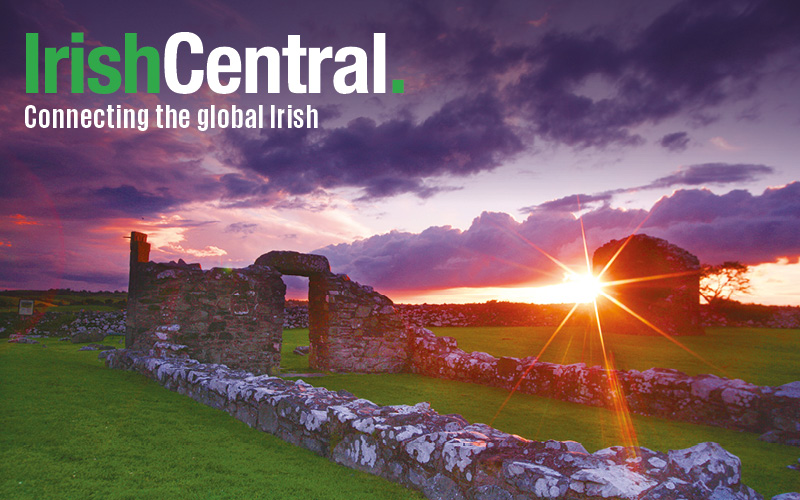A Massachusetts man is aiming to become the first person to walk two renowned routes of the 1960s and 1970s civil rights movements in the US and Northern Ireland.
Next week, Ken Johnston will trek 71 miles from Belfast to Derry in Northern Ireland to commemorate the 50th Anniversary of the 1969 “People’s Democracy March,” which sought to increase pressure for social justice and to draw attention to inequality and discrimination in Northern Ireland.
Read More: How Martin Luther King inspired a Northern Ireland uprising
That march had been modeled and inspired by the 1965 Selma to Montgomery marches in Alabama led by Dr. Martin Luther King to recognize African-American citizen’s right to vote and segregationist repression.

March 1965: American civil rights leader Martin Luther King (1929-1968) on a march in Alabama. With him is his fellow clergyman and civil rights campaigner Ralph Abernathy (1926 - 1990). (Photo by William Lovelace/Express/Getty Images)
By highlighting racial injustice, protestors contributed to the passage of that years Voting Rights Act, a landmark federal achievement of the Civil Rights Movement.
Johnston has been commemorating key civil rights events in the United States by walking long distances to symbolically retrace the experience of people who marched for present-day liberties.
Read More: One-third of British people believe Brexit makes a United Ireland likely
Last year Johnson walked the 400-mile Selma, Alabama, to Memphis, Tennessee, route as part of the 50th-anniversary commemoration services for the late civil rights leader, King. The trek took the long distance walker 30 days to complete.

“In Belfast, I hope to become the first person to have walked both the Selma to Montgomery trail in the U.S. and the Belfast to Derry trail,” he says.
Read More: Aisling Irish Center 5K memorial fundraiser set for April 7
“By doing these walks just 12 months apart, I hope to symbolically link these two Civil Rights movements.
“My story is about Dr. Martin Luther King's famous Selma to Montgomery Right to Vote March and how it inspired people across Northern Ireland back in the late 1960s and early 1970s."
On his trail in 2018, Johnston says he stopped in many of the places where King led protests, in order to reflect on the changes in those communities since that time.
“Even today, while African Americans now have the right to vote in all of the U.S., in some places that right is being suppressed,” Johnston explains.
"Six years after the U.S. Supreme Court struck down a key part of the Voting Rights Act, the State of Alabama has enacted a number of restrictive laws that have disproportionately affected African Americans, Latinos and other poor people."
Read more: JFK, Martin Luther King and the battle over human rights
"Alabama and some other Southern states have passed laws making voting more restrictive include Photo ID requirements to vote."
"Driver's license offices are closed in Black areas; proof of citizenship to register to vote in state and local elections; Closing of polling places (this was also seen in Georgia last year); Purging of voter rolls and contesting of provisional ballots."
“The first leg of my 2018 Freedom Walk was the 54-mile Selma to Montgomery National Historic Trail and that was when I began thinking about a similar Civil Rights movement in Northern Ireland in the late 1960s and early 70s.

Selma to Montgomery National Historic Trail sign. Image: WikiCommons
“The Civil Rights story in Northern Ireland, as well as in the U.S. today, is really about human rights, and it’s a story that has been evolving. I am inspired by the success of truth and reconciliation in Northern Ireland since the 1998 Good Friday Agreement,” says Johnston.
He explains that he wants to meet local leaders and learn community healing strategies, and share these insights with organizations in Selma and other parts of the United States.
Johnston's Northern Ireland walk comes amidst the current Brexit crisis, which he believes may have a detrimental effect on citizens rights.
Read More: Road tripping the Wild Atlantic Way on the Dingle Peninsula
"What's not clear is what kind of freedom UK citizens will have to travel without a passport after the April 12th deadline, if they plan to visit other EU member countries, including the Republic of Ireland.
While the Belfast to Derry route isn't marked out akin to the Selma to Derry route, Johnston hopes his walk may change that.
"There is no real Belfast to Derry trail. I'll be walking mostly on public walkways and roads. Maybe after people learn about my walk it will become a route tourist's in the future will want to explore for its historical significance."
Johnston’s “Peace Walk” will begin at Belfast City Hall on Wednesday, April 10, to mark the 21st anniversary of the Good Friday Agreement.

Belfast to Derry route
He was awarded the Amherst Irish Association’s Margaret Maher Award in 2018. The Association promotes positive associations to Ireland and matters Irish in the town of Amherst, Massachusetts by hosting events that explore aspects of Ireland's diaspora, culture, language, and society.
The award will finance Johnston's airfare to Ireland, however, he is actively seeking to raise $4,000 for other expenses via a GoFundMe page.
Further information can be found on his website: http://ourwalktofreedom.com
Ken's Belfast to Derry itinerary:
Day 1: Belfast City Hall to Antrim
Day 2: Antrim to the greater Maghera area
Day 3: Maghera to Feeny via Dungiven
Day 4: Feeny to Claudy
Day 5: Claudy to Derry via
What do you think of Johnston's concept of linking to two trails? Let us know in the comments below.




Comments